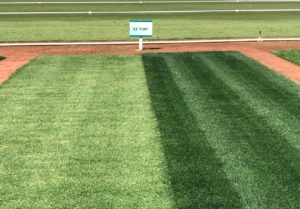Mar
When Should I Start to Spring Transition My Lawn to Bermudagrass?
I’d like to go over some common questions I have received through the blog in the last few weeks and see if it can help others with some of the same concerns. I always encourage everyone to send over your lawn questions and I will get back to you as soon as I can.
When should I start to transition my lawn back to bermudagrass?
I always recommend starting the process slowly in March and ramping up in April so your lawn has transitioned by May. I know that was a mouth full, but the truth is it’s not a short process unless you chemically transition your lawn. In March its ideal to start to gradually lower your mowing height and remove some of the turf canopy. This is not a scalp, this is lowering the height so the bermudagrass can breathe and get some sunlight. By mid-March you should be mowing two times per week and starting to see some thinning in the ryegrass. By thinning I mean bermudagrass leaves are starting to show between the ryegrass blades. Currently there is no need to fertilize the ryegrass, its time to back off on nutrition until bermudagrass season. In early April you can lightly verticut or even lightly power rake the lawn to remove some of the ryegrass giving way to bermudagrass. The more sunlight you can get in the grass, the faster you will transition. If the ryegrass remains extremely thick and lush you can expect it to provide excessive spring shade slowing down the bermudagrass. When soil temperatures reach 64 degrees (around April 15th) go ahead and apply ammonium sulfate 21-0-0 at 5 pounds per 1000 SF to jump start your bermudagrass. Continue mowing two times per week and gradually lowering your heights until you see the bermudagrass take over.
Spring Transition, keep lowering the height…..
Can I still put down pre-emergent for broadleaves?
Most of the grassy weeds and broadleaves are now germinating so putting down the preemergent will not yield the results you’re looking for. At this juncture its best to spot spray weeds depending on the type. Make sure the product is labeled for the weed you’re trying to control and can safely be used on bermudagrass. Grassy weeds use different chemicals than broadleaves and not all chemicals are safe and effective so check with specialty stores for better products.
What can I do to repair the urine damage from my dogs? Read the rest of this entry »
Comments Off on When Should I Start to Spring Transition My Lawn to Bermudagrass?Mar
Natural Grass Trumps Artificial Turf for Sports Stadiums
What does West Coast Turf have to do with Odell Beckham, Jr? A lot, actually. Most importantly, if OBJ had been playing on our natural grass, he may not have been sidelined for half of the Super Bowl game. Although United Airlines Field at Los Angeles Memorial Coliseum, former home of the Rams, is our client, the Rams now play at Sofi Stadium, which uses artificial turf. Something as simple as what’s beneath your feet can be crucial to an NFL player’s livelihood.
In a recent analysis, former NFL player, Chris Simms, says: “Can we get rid of field turf in football? Owners don’t want to spend money on anything. But owners, you will save so much money [if you have natural grass]. You won’t have to sign extra players on your roster. Maybe you’ll have to take care of the grass and cut the lawn, but can we get grass fields in every stadium? The great soccer players in Europe won’t even play – it’s in their contract – they won’t even play on field turf. We are ruining people’s careers. None of the players like to play on field turf over grass, none.”
Simms expressed frustration as a former NFL player and remembered when he played that “If we had a day that we were going to go on field turf, the players hated it. Especially the linemen. It feels different. There’s less give in the ground when you make cuts. The cuts can be very jarring, there is no give. That cleat gets in there and gets stuck. The rubber sends forces into your feet, legs, knees. You’re more tired.”
He makes many good points. NFL owners who have invested in their players don’t have their own interests at heart when they cut corners and use artificial turf. Any of their starting players can much more easily get injured on turf, possibly ending their season or career. West Coast Turf counts among our clients many sports fields in Major League Baseball, National Football League, Major League Soccer, College Football and many more and have a long history of providing natural turf to many sporting facilities. For more information visit our website at westcoastturf.com.
Comments Off on Natural Grass Trumps Artificial Turf for Sports Stadiums

